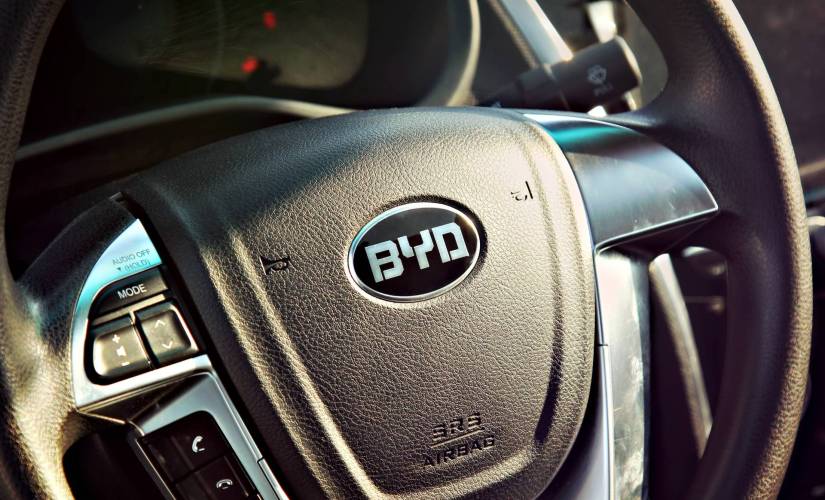BYD, the largest manufacturer of electric vehicles in China, has proposed investing $1 billion in India in order to produce electric vehicles and batteries there. Megha Engineering and Infrastructures of Hyderabad, India, and BYD have formed an electric vehicle (EV) joint venture. If the investment goes through, BYD will be able to increase its global presence and compete in all of the world’s major auto markets outside of the United States.
In an effort to catch up to Tesla, the market leader in EV sales, BYD is rapidly expanding around the world. The company has become the largest manufacturer of electric and plug-in hybrid cars worldwide. BYD has already invested $200 million in India, while Tesla has only recently resumed talks with the government after postponing plans to enter the market last year.
The Blade battery manufacturer also plans to manufacture 100,000 electric vehicles per year in India within the next few years, though it is likely to begin by shipping vehicles in parts for assembly in the country while it establishes a local supply chain. The Indian government has not responded to BYD’s proposal yet.
BYD has proposed to Indian authorities that it and Hyderabad’s privately held Megha Engineering and Infrastructures form an EV joint venture. From affordable hatchbacks to high-end luxury vehicles, BYD plans to manufacture them all in India.
Production of electric vehicles in India is planned for the future. If the investment goes through, BYD will be able to make its entire range of electric vehicles in India, from subcompacts to high-end sedans. In addition to the proposed charging stations, the proposal also calls for the construction of R&D and training facilities in India.
In India, where it sells the Atto 3 electric SUV and the e6 EV to corporate fleets, BYD has already invested $200 million. This year should see the introduction of the company’s Seal high-end electric sedan. While only 1.1% of India’s total car sales (3.8 million) were electric vehicles in 2022, the government there hopes to increase that number to 30% by 2030.
BYD will go up against the likes of Tata Motors, a domestic automaker, and MG Motor, a Chinese rival, in the electric vehicle market in India. If the plan is implemented, BYD will be able to produce its entire range of electric vehicles in India, from subcompacts to high-end sedans.
BYD and Megha Engineering and Infrastructures of Hyderabad have proposed forming an electric vehicle (EV) joint venture to Indian regulators. The collaborative proposal envisions the installation of charging stations across India in addition to the construction of R&D and education hubs. BYD and Megha Engineering propose to build R&D and training facilities, as well as install charging stations in India as part of the investment proposal.
Olectra Greentech was founded in 2013 as a joint venture between BYD and Megha Engineering to produce electric buses. With this proposed partnership, BYD would be able to sell electric cars in addition to its existing electric buses.
The government of India has set a goal of increasing the EV market share to 30% by 2030, making the country a desirable location for international investors. However, beginning in the year 2020, India began to more closely monitor investments from its neighbors, including China. In order to establish a supply chain, BYD and Megha Engineering will likely begin by importing vehicle components for local assembly.
The business has already established a presence in both Europe and South America through the establishment of manufacturing facilities there. In 2022, BYD surpassed Tesla as the largest producer of EVs and PHEVs thanks to sales of 1.86 million vehicles.
First reported on CNBC
Frequently Asked Questions
Q1: What is BYD’s proposed investment in India?
A1: BYD, the largest manufacturer of electric vehicles in China, has proposed investing $1 billion in India to produce electric vehicles and batteries. This investment aims to increase BYD’s global presence and allow it to compete in major auto markets worldwide, except for the United States.
Q2: How does BYD’s expansion strategy compare to Tesla’s?
A2: BYD is rapidly expanding globally to catch up to Tesla, the market leader in electric vehicle sales. By establishing manufacturing facilities in Europe and South America, BYD has become the largest producer of electric and plug-in hybrid cars worldwide, surpassing Tesla in terms of sales volume.
Q3: What are BYD’s plans for manufacturing electric vehicles in India?
A3: BYD plans to manufacture 100,000 electric vehicles per year in India within the next few years. Initially, the vehicles are likely to be shipped in parts for assembly while BYD establishes a local supply chain. The company aims to produce its entire range of electric vehicles in India, from affordable hatchbacks to high-end luxury sedans.
Q4: Has BYD already made investments in India?
A4: Yes, BYD has already invested $200 million in India. It currently sells the Atto 3 electric SUV and the e6 EV to corporate fleets in the country. Additionally, BYD plans to introduce its Seal high-end electric sedan to the Indian market this year.
Q5: How does BYD’s investment align with the Indian government’s goals?
A5: The Indian government has set a goal of increasing the market share of electric vehicles to 30% by 2030. BYD’s proposed investment in India aligns with this objective and positions the company to benefit from the growing demand for electric vehicles in the country.
Q6: Who are the potential competitors for BYD in the Indian electric vehicle market?
A6: BYD will face competition from domestic automakers like Tata Motors and Chinese rival MG Motor in the Indian electric vehicle market. However, if the proposed investment is implemented, BYD will have an advantage by being able to produce its entire range of electric vehicles in India.
Q7: What other plans are included in BYD’s investment proposal?
A7: Alongside the manufacturing of electric vehicles, BYD and its partner, Megha Engineering and Infrastructures of Hyderabad, have proposed building charging stations across India. The investment plan also includes the construction of research and development (R&D) and training facilities in the country.
Q8: What is the Indian government’s stance on electric vehicles?
A8: The Indian government is supportive of electric vehicles and aims to increase the market share of electric vehicles from 1.1% in 2022 (out of a total of 3.8 million vehicles sold) to 30% by 2030. This government support, combined with India’s large population, makes it an attractive market for international electric vehicle manufacturers.
Q9: How will BYD’s proposed joint venture with Megha Engineering benefit its electric vehicle offerings in India?
A9: The joint venture with Megha Engineering will allow BYD to offer electric cars in addition to its existing electric buses in the Indian market. This collaboration strengthens BYD’s position and competitiveness in the Indian electric vehicle market.
Q10: How does BYD’s expansion strategy position it in the global electric vehicle market?
A10: BYD’s rapid expansion strategy positions it to compete with Tesla in major auto markets worldwide, outside of the United States. With manufacturing facilities in various regions and its proposed investment in India, BYD aims to increase its global presence and become a prominent player in the electric vehicle industry.




